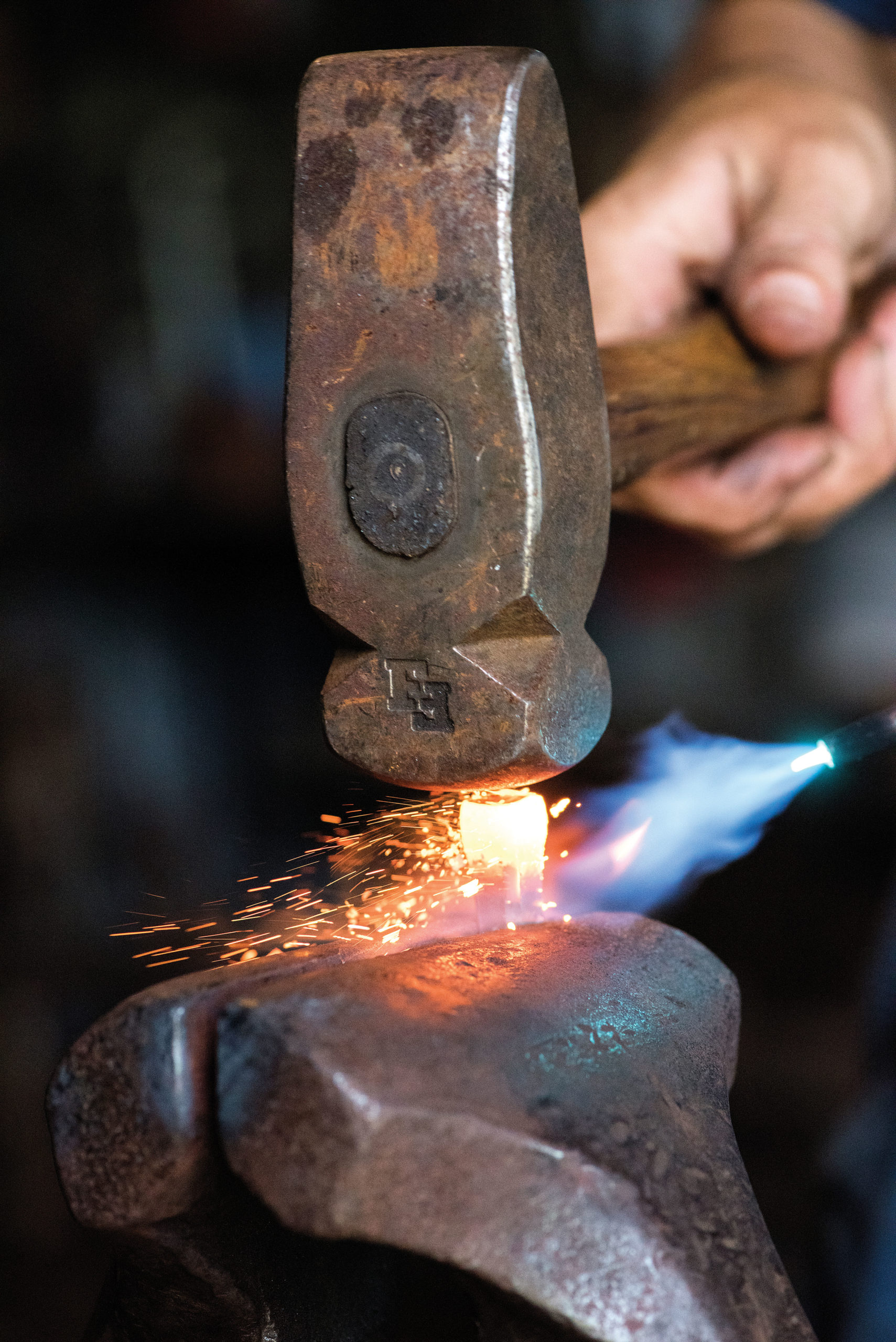
Timeless Tools
July 5, 2019
Written By Jason Jenkins
At 47 years old, Will Dobkins still remembers an age when things were built to last. Whether it was a television set, a vacuum or some other household convenience, there was an expectation that products would stand the test of time and regular use. And, should something go awry, there would be a repairman with the parts and skills to get them running again.
Those days are but a memory. Like dinosaurs, TV and small-appliance repairmen have gone extinct as the products they once maintained are now built to be replaced, never repaired.
“It seems everything in our world is designed to be cheap, immediate and disposable, and garden tools are no different,” Will says. “There are some good tools out there, but there’s also a lot of junk. We owe it to the resources we consume to at least try to turn them into good stuff.”
For the past six years, Will and his wife, Melissa, have put this belief into practice. From their small farm in Ozark County, they operate Homestead Iron, a blacksmith shop offering a complete line of high-quality, hand-forged garden tools. Their products have gained a loyal following among gardeners, homesteaders, small-scale farmers and others who recognize the value of implements crafted for a lifetime of use.
“Our most popular trowel sells for $36,” Will explains. “Now, that may seem like a lot for a trowel, but compare it to buying a $5 one that you’re constantly replacing. All of a sudden, that $36 trowel is cheap because you never have to buy another one. Plus, it just works better.”
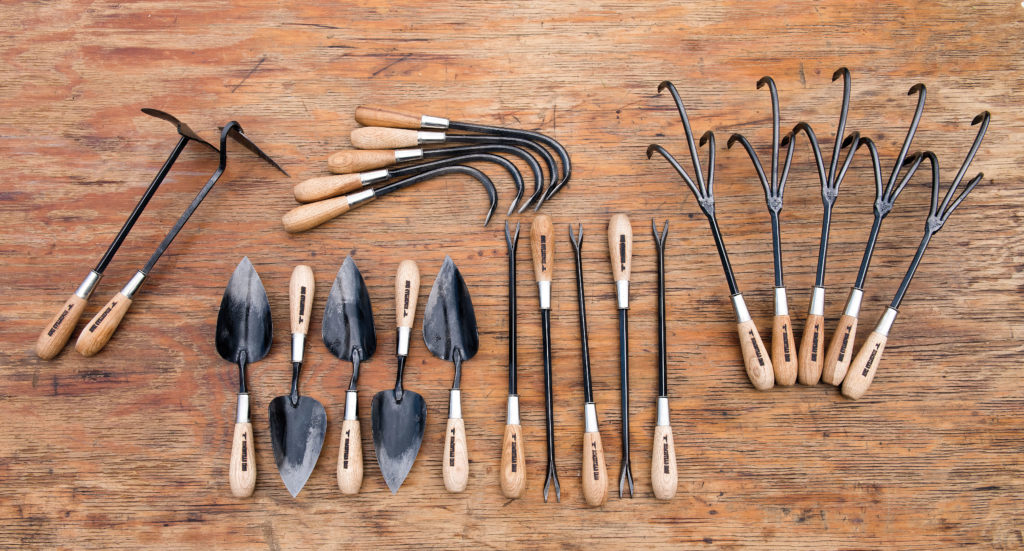
Blacksmith Beginnings
Anvils, forges, hammers and tongs always have been part of Will’s life. The tradition of blacksmithing can be traced back four generations to Will’s great-grandfather, William “Willie” Dobkins.
“Grandpa Willie was a traveling preacher, photographer and blacksmith in the Ozarks in the early 1900s,” Will says.
“He’d load his wagon and cruise around taking pictures of people, preaching, shoeing horses and doing simple blacksmith repairs.”
When he’d return home after a two-week circuit, Willie would process his photographs, making prints to sell the next time he traveled through an area. Today, a collection of those images is preserved by the State Historical Society of Missouri as a record of everyday life in the Ozarks in the early 20th century.
Willie passed his penchant for blacksmithing to his son, Theodore, who spent time in the 1930s working with steel and fire at Crockett Bit & Spur Co. in Lenexa, Kan., one of the world’s most renowned spur makers.
Blacksmithing in the Dobkins family continued with Theodore’s son, James. He worked in Wyoming both as a pipeline welder in the oil industry and heavy equipment repairman in the coal industry. He eventually moved his family back to Missouri, settling in Steelville.
“There’s a picture of me at 6 or 7 years old cranking on the old coal forge in Dad’s shop,” Will recalls. “I remember sitting on the bench watching him run the mill or the lathe. I watched him weld a lot, too. As kids, we used to take sparklers around the Fourth of July and pretend we were welding on cardboard boxes. As a teenager, I started forging a few things myself.”
James had a love of aviation, especially the war birds of World War II. That passion rubbed off on his son. After graduating from Steelville High School, Will became an aircraft mechanic.
“I worked for airlines in big cities like Toronto and Portland, which is where I met Melissa,” Will says. “I enjoyed working on the old-school jet technology. You really had to troubleshoot them and out-think them to make them fly. But as everything went digital, all the ones and zeroes weren’t as much fun to work on. It drove me out of turning wrenches.”
As a boy, Will read about the mountain men and settlers who tamed the American West. He wondered what it would be like to take a piece of land and carve out a living. He and Melissa decided to give up city life and start homesteading on 40 acres of raw land in Oregon.
“We grew a big garden. We raised goats, sheep and pigs. We lived in a teepee for a year and a half while we built a cabin,” Will says. “It was fun, and we learned a lot. By stripping away the trappings of modern life, we learned what was important and what made us happy.”
To earn money, Will took a job in a local forge shop and reacquainted himself with his blacksmithing heritage. As he advanced his skills, he began selling a few items — eventually finding a niche with garden tools.
“So, six years ago, we came up with a plan to move back to Missouri and start Homestead Iron,” Will says.
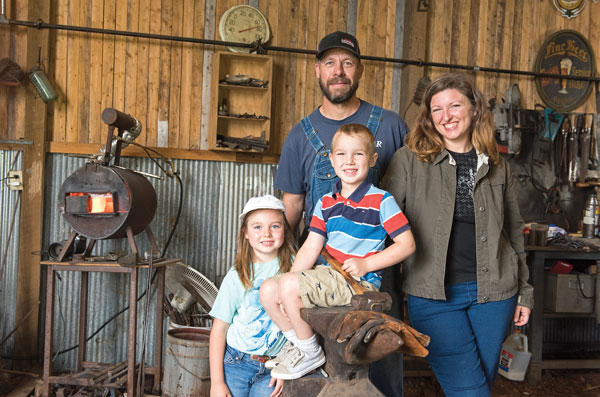 The Dobkins family — Will and Melissa, along with their children Samantha, 6, and Aengus, 4 — has found a unique business niche that allows them to make their home deep in the Ozarks while still earning a living.
The Dobkins family — Will and Melissa, along with their children Samantha, 6, and Aengus, 4 — has found a unique business niche that allows them to make their home deep in the Ozarks while still earning a living.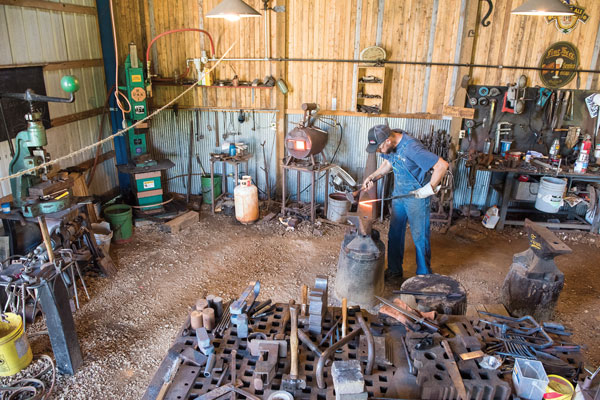 In his fully equipped blacksmithing shop, Will spends his days turning raw steel into useful garden tools, some of which are inspired by designs from the past.
In his fully equipped blacksmithing shop, Will spends his days turning raw steel into useful garden tools, some of which are inspired by designs from the past.
Superior Steel
Today, the blacksmith offers more than three dozen garden tools — including cultivators, hoes, trowels, forks, rakes and shovels — ranging in price from $25 to $75. Many of the designs are inspired by tools that may be as old as a century or more. Will crafts his tools from C1075 high-carbon steel, the same material used to make axes and machetes.
“The cheaper tools out there aren’t made from the right kind of steel,” Will says. “It’s not bad material, just the wrong application. It’s great for a toaster or a car fender, but it’s not tool steel, and there’s a huge difference.”
He says C1075 offers both toughness and edge retention.
“Most of the tools you’ll find have no edge because the material won’t hold one, even if you grind it on there,” Will explains. “When you have a sharp tool, it lasts longer and makes the work easier. Imagine butchering meat with a dull knife. It’s the same concept. We like to say that we make the sharpest tools in the shed.”
Over the years, Will has perfected his tool-making process, combining traditional and modern techniques. While he still spends considerable time at the anvil with hammer in hand, turning steel into money is the name of the game. So, Will has embraced technologies such as pneumatic power hammers, TIG welders and plasma cutters to speed production. He estimates each tool now takes 20 to 30 minutes to fabricate, which is significantly less than when he began — a result of both improved experience and efficient equipment.
Homestead Iron tools can be purchased directly from the company’s website and at a few retail locations, such as the Baker Creek Heirloom Seed Co. in Mansfield. The Dobkinses also travel to several garden shows during the year. Every tool comes with a lifetime guarantee.
“It’s the best guarantee you’ll never need,” jokes Will, who says that of the nearly 8,000 tools he’s sold in the past six years, only two have ever been returned. “Of course, you have to admit to what you did to it first. At the end of the day, they’re for planting flowers, not for breaking beads on truck tires or stuff like that.”
In addition to his standard tool inventory, which he’s constantly expanding, Will offers tool repair and restoration services. He also takes custom orders. “People will bring me a hoe and say, ‘This was my grandpa’s hoe. Can you make one just like it?’” he says. “I’ve intentionally made brand-new tools with a hundred years of wear on them because that’s how they want them.”
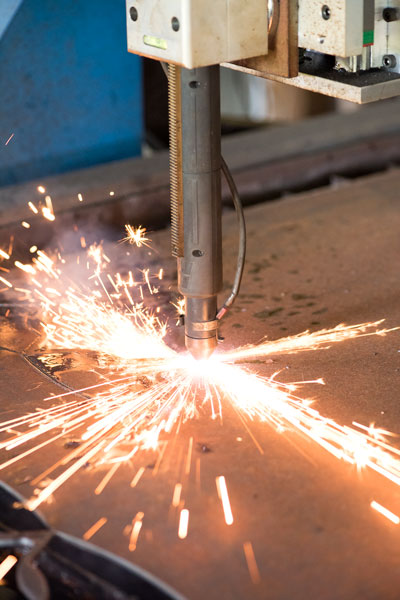 To speed production, Will has embraced modern technologies such as this plasma cutter, which allows him to cut out tool shapes quickly and more efficiently.
To speed production, Will has embraced modern technologies such as this plasma cutter, which allows him to cut out tool shapes quickly and more efficiently.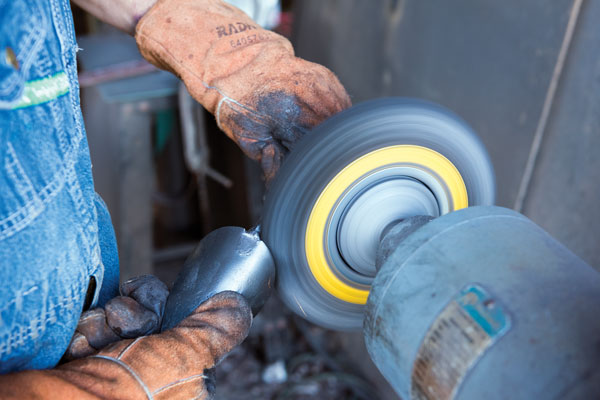 To speed production, Will has embraced modern technologies such as this plasma cutter, which allows him to cut out tool shapes quickly and more efficiently.
To speed production, Will has embraced modern technologies such as this plasma cutter, which allows him to cut out tool shapes quickly and more efficiently.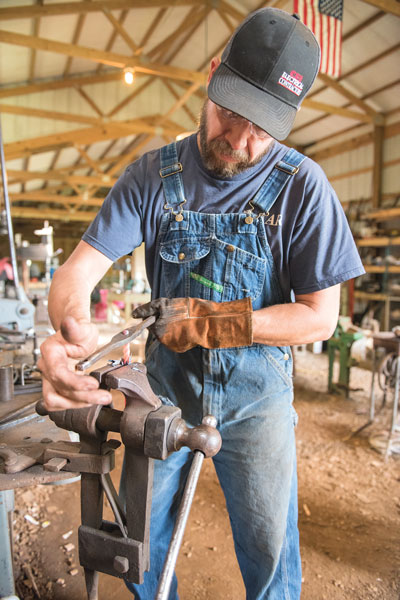 Adding a twisting to a tool shank ensures that when the handle is installed, it stays put without glue or epoxy. Will says it’s an old-school trick that railroad tie hackers once used to keep their spikes from pulling out of the ties as they floated down Ozark streams.
Adding a twisting to a tool shank ensures that when the handle is installed, it stays put without glue or epoxy. Will says it’s an old-school trick that railroad tie hackers once used to keep their spikes from pulling out of the ties as they floated down Ozark streams.
More recently, Will has started offering blacksmithing tools, including hammers and tongs.
“Making the hammers is a fun change of pace,” he says. “I love forging and hitting hot steel. The garden tools are about 50 percent forge time. The hammers are about 90 percent.”
Now with two children — Samantha, 6, and Aengus, 4 — the Dobkinses are grateful to have found a unique niche that allows them to make their home deep in the Ozarks while still earning a living.
“Every day, I have a chance to be better at what I do than I was the day before. No matter how good you get at this, there’s always more to learn,” Will says. “When I’m done at the end of the day, there’s something new and tangible that didn’t exist until I made it. I really love that.”
For more information about Homestead Iron’s hand-forged garden tools, visit www.homesteadiron.com or call 417-543-5182.

